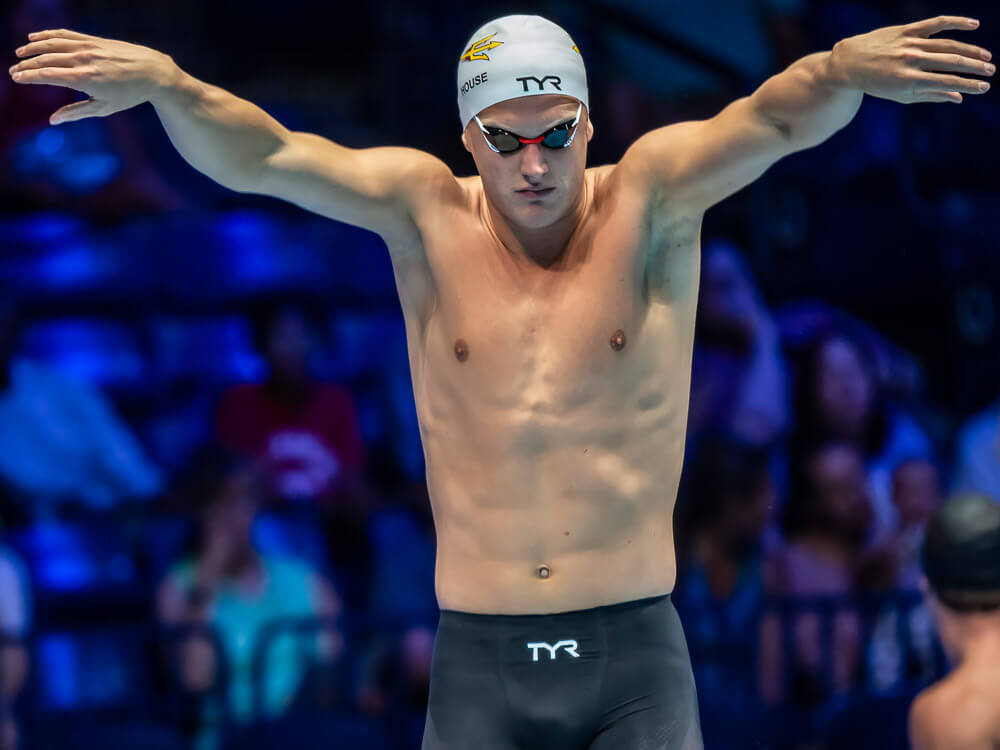Grant House Got Involved With NCAA Lawsuit to ‘Open Up The Doors,’ Not Deny Opportunities (VIDEOS)

Grant House Got Involved With NCAA Lawsuit to ‘Open Up The Doors,’ Not Deny Opportunities
When he became associated with the lawsuit that would later bear his name, Grant House had no idea of the wide-ranging implications for college sports that would result over the next several years. He never expected to be the individual his fellow swimmers would blame for losing their opportunities to swim in college. Rather, House thought he was working for a brighter future for college athletes, with a focus on those in non-revenue sports such as swimming. He believed his accomplishments swimming for Arizona State and for the United States at international competitions would help the movement gain legitimacy.
“They thought I checked off all the boxes, and I was the ideal candidate for this. And what I didn’t know at the time was getting involved in,” House said. “I think a lot of people think this is just about tearing down college sports, and it’s really about rewriting the rules so Olympic sport athletes and swimmers, especially, have something they can build on their own.”
Over the weeks and months following his initial involvement, House realized that the group with which he had involved himself had more landscape-altering goals than he initially realized, leading to the eventual settlement expected to be adopted in time for the 2025-26 season. That settlement will allow direct payments to athletes and eliminate scholarship maximums for universities in Power Conferences and other conferences who opt in but institute strict roster limits for each sport, with swimming and diving maxed at 30 spots per gender.
With coaches and university officials expecting the House settlement to be in place for next season, hundreds of swimmers across the country have been cut from their teams and forced to seek new swimming homes via the transfer portal. The resulting financial changes are expected to create a discrepancy between well-funded swim teams and those who lose funding while their athletic department redirects money toward revenue-generating sports like football and basketball. Further schools will simply cut their swim teams, citing the new legislation.

Grant House — Photo Courtesy: Peter H. Bick
Not at all what House had in mind when he initially signed on, but even now, he insists he has no regrets. The former Sun Devil swimmer originally from the Cincinnati area believes that this latest transformation can build off the introduction of name, image and likeness (NIL) rights for college athletes four years ago, providing swimmers a chance to build their own brands and extend their careers.
“This lawsuit, this process, opens up the doors,” House said. “It’s opened up doors for athletes to now have that ability to create on their own, not just perform, but to actually create going forward, instead of just compete. And I think that’s a really big aspect that always spoke to me. Whenever I was done in college, whenever I’m done with the sport, really setting a platform for all Olympic sport athletes to have more foundation and support and resources to compete as long as they want.”
The roster limits, likely to be the most crippling aspect of the settlement relating to swimmers’ opportunities on the college level, were never part of the equation House expected when the process began. He does not understand their necessity and remains frustrated with the NCAA’s position on their implementation.
Claudia Wilkins, the federal judge overseeing the case, has denied final approval for the House settlement because of the potential for lost opportunities. She has suggested a compromise that would allow current student-athletes an exemption from roster caps and have a phased implementation of the new restrictions, but the NCAA has responded they will not force universities to keep already-cut athletes on their rosters.
“I think it shows the true nature of the NCAA,” House said. “I think the lawyers continuously not acknowledging the request of Judge Claudia Wilkins, and continuously over three processes now, with the final hearing included, not making any revisions or amendments really to her request of the roster limits shows how they value NCAA athletes and college athletes, and to amend the college roster limits, even just to grandfathering them.
“She’s not even asking them to eliminate them completely. It seems like she may want to, but just to have a compromise and middle ground, they’re not willing to budge at all, other than to most recently say, ‘Oh, we’re going to leave it up to the colleges.’”
House remains optimistic that his fellow swimmers will be able to overcome these changes, even if they are initially cut from their rosters or lose a chance to compete for their first-choice school. He hopes that swimmers will be able to find new swimming homes that “very well may be better suited for them, where they get better attention, energy and care and compassion from the coaching staff, rather than being one of the lower rungs of ladder at a bigger place.”
The most notable program to be cut so far has been Cal Poly, and House has met with swimmers from that team to offer his support, although the team still has an ambitious financial goal to attain in hopes of saving the program.
He realizes that many in the swimming community blame him for the massive upheaval surrounding the sport on the college level, but House still wants the public “to understand I’m not pulling the strings.” His aims to provide a brighter future for college swimmers turned into a paradigm-shifting wave that House, perhaps naively, could never have anticipated.
“I quite frankly don’t know these things that happen along the way. I’m not informed. I’m simply the lead plaintiff. I’m not making these decisions. I don’t wish this upon anyone. I wasn’t involved in the discussions for roster limits when it’s happening. I didn’t even know that was in the cards when these negotiations were going on, and so I’m really advocating for them.”




I’ve been practicing law for over 30 years. I make recommendations to my clients, but they ultimately decide whether to accept a settlement or not. If I settle a case without my client’s approval, then I would be subject to professional discipline up to and including loss of my license to practice law. I could also be sued by my clients for breaching my professional obligations to them. I never make a settlement proposal to the other side without express written permission of my clients to make that offer.
He’s the lead Plaintiff in the case. He should have been involved in the settlement negotiations. If his attorneys were not communicating with him about settlement negotiations, then they then violated the rules of professional conduct. If his attorneys cut a deal that he did not like, then he should have told them that he didn’t like the deal and would not agree to it. If his attorneys did not like this, then he should have fired his attorneys and gotten new ones. If his attorneys filed a motion to approve a settlement that he did not agree with, then he should have fired them, reported them to all the bars where they were admitted for professional misconduct and obtained new counsel.
Meh I don’t buy it. He doesn’t regret it and doesn’t have any remorse. He will ride off with his $125k check and disappear from the swimming scene in less than 2 years.
He has childhood ties to the town I grew up in. I never ran across him but many have stated that his family are hard people to be around. I’ve heard that at least one of his parents has a career in the legal world. If that’s the case, it would be even harder to see how this result surprised him.
Absolutely erroneous. Wow.
His parents are swim coaches. They invested their lives in teaching / improving kids. No reason to attack them. And you obviously don’t know them.
As for Grant, here is the truth. Greedy lawyers saw an angle to secure a nine figure payday. But they needed an athlete to be able to enter the courtroom. They then sought out and preyed upon a naive 19 year old who had different altruistic aspirations.
Lawyers then used and discarded Grant just as if he was a ticket stub required to gain access to a movie theater and then discarded before the movie even begins. Grant has invested his entire life in swimming and excellence. The public’s ignorance about the actual dynamics of his name being used in the case that began in 2019 is a tragedy.
Bravo, Sir! Well said.
What are you, 12? Really going put your stakes on some he said, she said crap? You couldn’t be more far off. I’ve know the House family since Grant was an age group swimmer and not once have he, his parents, or siblings ever come across as selfish or difficult. They legitimately live for the sport.
How about you direct your anger at the absolute abuse colleges are taking in paying their football players million dollar salaries that have nothing to do with earned Name Image or Likeness. How about you think beyond a headline for once and call out the real issues here.
Edit: I was wrong about one of his parents potentially having a legal background. I can own that and apologize for the ill informed comment regarding it. I still don’t think Grant plays the victim role well and didn’t have an idea of the fallout as things progressed. He still agreed to the settlement and will walk away with his portion. Even a patsy has a responsibility if you are bold enough to put your name to the mistake.
A lot of factors went into the ASU Men moving up from nowhere to 6th to winning the NCAA title, including good work from the coaching staff and athletes. But just as significant in coordinating the efforts of 20+ athletes from around the country, and world, are their parents and families who put in significant energy and support. The Sun Devil parent group has been highly effective over the time of the team’s meteoric rise. And at the end of time Grant was involved on the team (well, my understanding is that he is still involved on the team, training with the Sun Devil pro group) his mother was honored as the ‘parent of the year.’
It’s not the kind of honor a ‘selfish’ parent would receive.
I agree! I know many of the ASU parents and they are a great group!
So the lead plaintiff had no idea what was being negotiated? This was created by and driven by a bunch of lawyers who want to cash in. They just needed a shmuck to lend his name to the lawsuit.